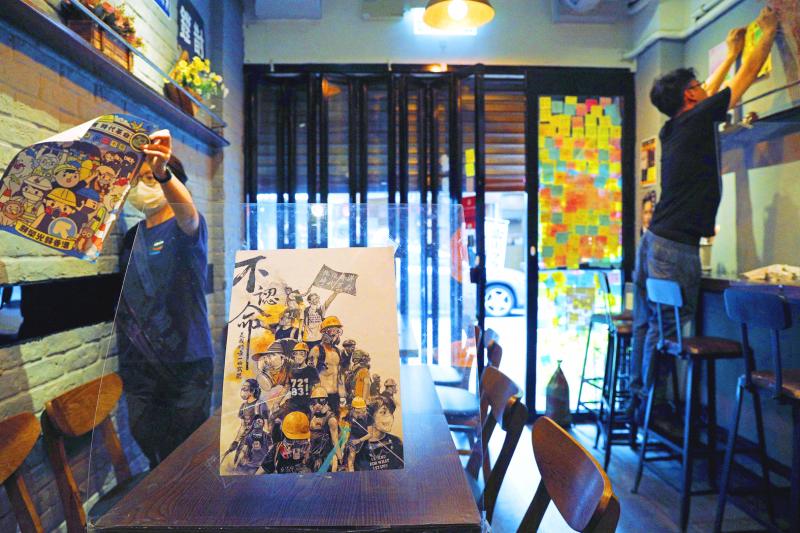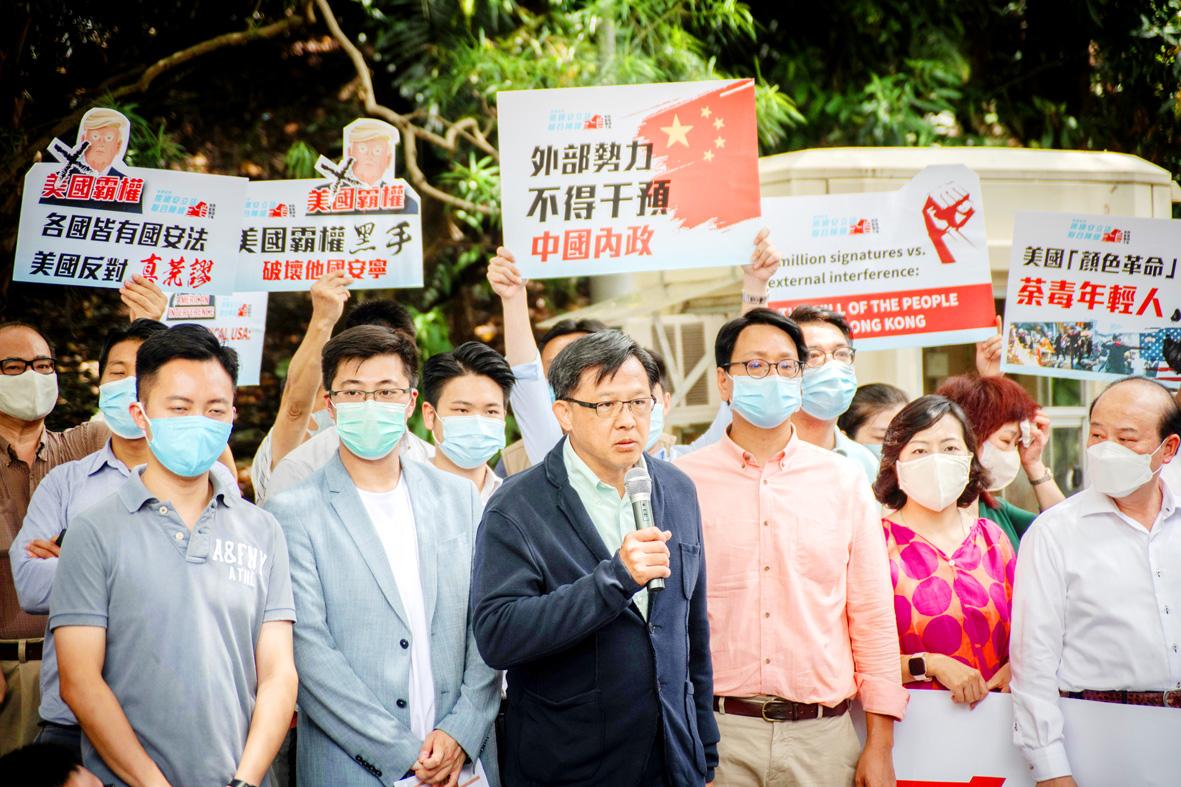Taiwanese should avoid unnecessary visits to or transit through Hong Kong, Macau or China after the passing of “outrageous” national security legislation for the former British colony, Mainland Affairs Council (MAC) Deputy Minister Chiu Chui-cheng (邱垂正) said yesterday.
Speaking to reporters in Taipei, Chiu said the legislation was “the most outrageous in history” with a reach that extended everywhere.
However, the Taipei Economic and Cultural Office in Hong Kong would continue to operate, he said.

Photo: AP
“We would not take the initiative to withdraw it, unless there are external factors,” he said. “We would stay until the last minute.”
In related news, the Chinese government and pro-Beijing activists in Hong Kong condemned what they called foreign meddling in the territory’s affairs, as more countries moved to offer Hong Kongers refuge and impose sanctions on Beijing over the new legislation.
Chinese Ministry of Foreign Affairs spokesman Zhao Lijian (趙立堅) said no amount of pressure from external forces could “shake China’s determination and will to safeguard national sovereignty and Hong Kong’s prosperity and stability.”

Photo: Bloomberg
He urged the US to stop interfering in Hong Kong’s affairs, and not sign a sanction bill into law, referring to the US House of Representatives approval on Wednesday of a bill rebuking China over its crackdown in the territory.
If the bill becomes law, “China will definitely take strong countermeasures, and all consequences will be borne by the US side,” he said.
The Chinese embassy in London said that Britain’s offer to extend residency rights to up to 3 million Hong Kongers eligible for British National Overseas passports would be in breach of “international law and basic norms governing international relations.”
“We firmly oppose this and reserve the right to take corresponding measures,” it said in a statement, without elaborating.
Australian Prime Minister Scott Morrison yesterday said his government is also considering a move to provide a “safe haven” to Hong Kongers.
Dozens of pro-Beijing advocates and lawmakers protested outside the US consulate in Hong Kong to demand that the US stop meddling.
They said they had gathered 1.6 million signatures online in support of its call.
Tam Yiu-chung (譚耀宗), Hong Kong’s sole delegate to the National People’s Congress Standing Committee, told Radio Television Hong Kong that the new legislation was not harsh.
“If it were, no one would dare violate it,” he said.
Meanwhile, Hong Kong Chief Justice Geoffrey Ma (馬道立) said that judges appointed to cases under the new legislation would be appointed on the basis of judicial and professional qualities, not politics.
In a rare statement, Ma said assigning judges to cases would be the sole responsibility of the judiciary, apparently seeking to allay fears that judges for national security cases would be picked by Hong Kong Chief Executive Carrie Lam (林鄭月娥).
“Judges of foreign nationality are not excluded. They are expressly permitted to be appointed as judges in Hong Kong,” Ma said.
However, the Bar Association said the legislation undermines the territory’s independent judiciary and stifles freedoms.
In a five-page analysis, the association said that the new national security offences “are capable of being applied in a manner that is arbitrary, and that disproportionately interferes with fundamental rights, including the freedom of conscience, expression and assembly.”

DAREDEVIL: Honnold said it had always been a dream of his to climb Taipei 101, while a Netflix producer said the skyscraper was ‘a real icon of this country’ US climber Alex Honnold yesterday took on Taiwan’s tallest building, becoming the first person to scale Taipei 101 without a rope, harness or safety net. Hundreds of spectators gathered at the base of the 101-story skyscraper to watch Honnold, 40, embark on his daredevil feat, which was also broadcast live on Netflix. Dressed in a red T-shirt and yellow custom-made climbing shoes, Honnold swiftly moved up the southeast face of the glass and steel building. At one point, he stepped onto a platform midway up to wave down at fans and onlookers who were taking photos. People watching from inside

A Vietnamese migrant worker yesterday won NT$12 million (US$379,627) on a Lunar New Year scratch card in Kaohsiung as part of Taiwan Lottery Co’s (台灣彩券) “NT$12 Million Grand Fortune” (1200萬大吉利) game. The man was the first top-prize winner of the new game launched on Jan. 6 to mark the Lunar New Year. Three Vietnamese migrant workers visited a Taiwan Lottery shop on Xinyue Street in Kaohsiung’s Gangshan District (崗山), a store representative said. The player bought multiple tickets and, after winning nothing, held the final lottery ticket in one hand and rubbed the store’s statue of the Maitreya Buddha’s belly with the other,

‘NATO-PLUS’: ‘Our strategic partners in the Indo-Pacific are facing increasing aggression by the Chinese Communist Party,’ US Representative Rob Wittman said The US House of Representatives on Monday released its version of the Consolidated Appropriations Act, which includes US$1.15 billion to support security cooperation with Taiwan. The omnibus act, covering US$1.2 trillion of spending, allocates US$1 billion for the Taiwan Security Cooperation Initiative, as well as US$150 million for the replacement of defense articles and reimbursement of defense services provided to Taiwan. The fund allocations were based on the US National Defense Authorization Act for fiscal 2026 that was passed by the US Congress last month and authorized up to US$1 billion to the US Defense Security Cooperation Agency in support of the

‘COMMITTED TO DETERRENCE’: Washington would stand by its allies, but it can only help as much as countries help themselves, Raymond Greene said The US is committed to deterrence in the first island chain, but it should not bear the burden alone, as “freedom is not free,” American Institute in Taiwan Director Raymond Greene said in a speech at the Institute for National Defense and Security Research’s “Strengthening Resilience: Defense as the Engine of Development” seminar in Taipei yesterday. In the speech, titled “Investing Together and a Secure and Prosperous Future,” Greene highlighted the contributions of US President Donald Trump’s administration to Taiwan’s defense efforts, including the establishment of supply chains for drones and autonomous systems, offers of security assistance and the expansion of